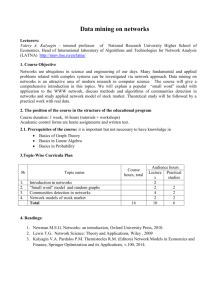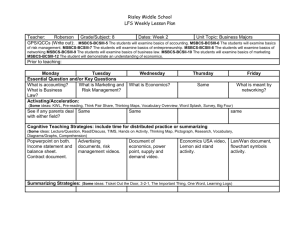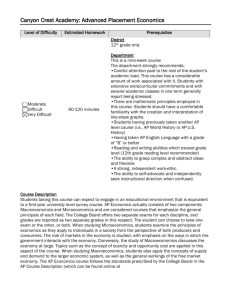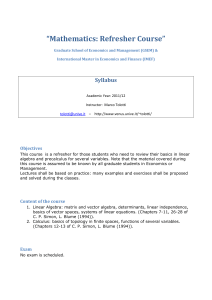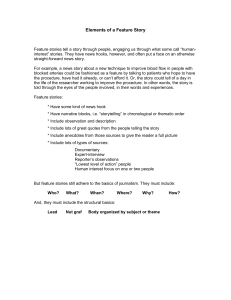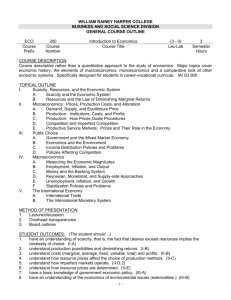Intended Learning Outcomes of the programme Bachelor in Marketing
advertisement
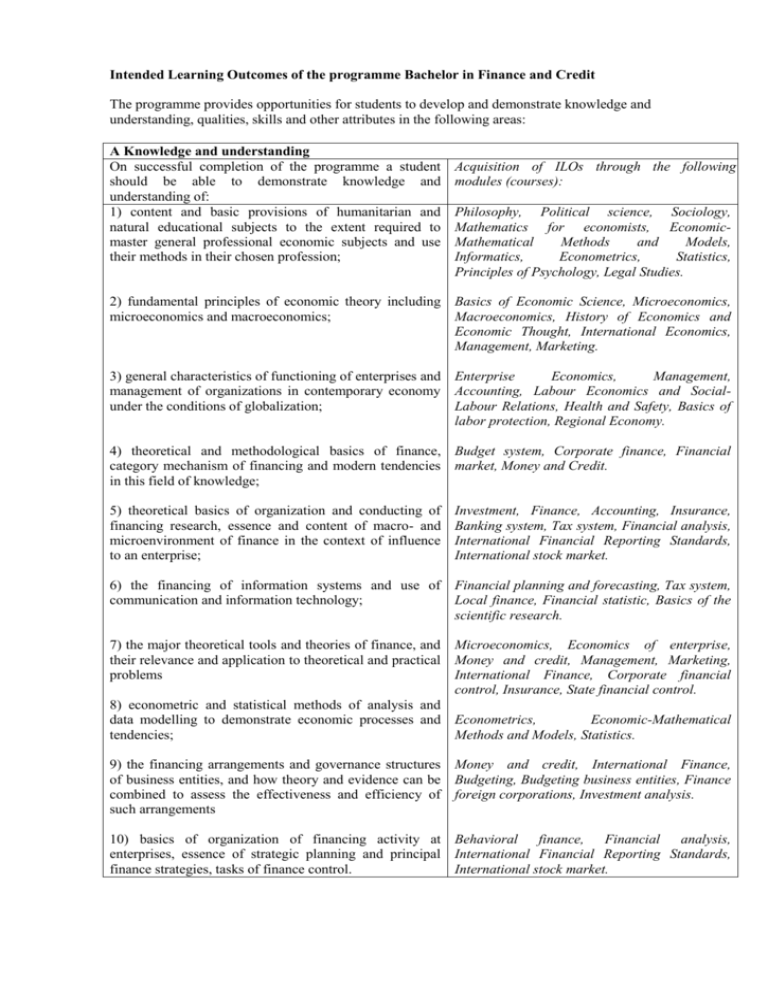
Intended Learning Outcomes of the programme Bachelor in Finance and Credit The programme provides opportunities for students to develop and demonstrate knowledge and understanding, qualities, skills and other attributes in the following areas: A Knowledge and understanding On successful completion of the programme a student should be able to demonstrate knowledge and understanding of: 1) content and basic provisions of humanitarian and natural educational subjects to the extent required to master general professional economic subjects and use their methods in their chosen profession; Acquisition of ILOs through the following modules (courses): Philosophy, Political science, Sociology, Mathematics for economists, EconomicMathematical Methods and Models, Informatics, Econometrics, Statistics, Principles of Psychology, Legal Studies. 2) fundamental principles of economic theory including Basics of Economic Science, Microeconomics, microeconomics and macroeconomics; Macroeconomics, History of Economics and Economic Thought, International Economics, Management, Marketing. 3) general characteristics of functioning of enterprises and Enterprise Economics, Management, management of organizations in contemporary economy Accounting, Labour Economics and Socialunder the conditions of globalization; Labour Relations, Health and Safety, Basics of labor protection, Regional Economy. 4) theoretical and methodological basics of finance, Budget system, Corporate finance, Financial category mechanism of financing and modern tendencies market, Money and Credit. in this field of knowledge; 5) theoretical basics of organization and conducting of financing research, essence and content of macro- and microenvironment of finance in the context of influence to an enterprise; Investment, Finance, Accounting, Insurance, Banking system, Tax system, Financial analysis, International Financial Reporting Standards, International stock market. 6) the financing of information systems and use of communication and information technology; Financial planning and forecasting, Tax system, Local finance, Financial statistic, Basics of the scientific research. 7) the major theoretical tools and theories of finance, and Microeconomics, Economics of enterprise, their relevance and application to theoretical and practical Money and credit, Management, Marketing, problems International Finance, Corporate financial control, Insurance, State financial control. 8) econometric and statistical methods of analysis and data modelling to demonstrate economic processes and Econometrics, Economic-Mathematical tendencies; Methods and Models, Statistics. 9) the financing arrangements and governance structures Money and credit, International Finance, of business entities, and how theory and evidence can be Budgeting, Budgeting business entities, Finance combined to assess the effectiveness and efficiency of foreign corporations, Investment analysis. such arrangements 10) basics of organization of financing activity at Behavioral finance, Financial analysis, enterprises, essence of strategic planning and principal International Financial Reporting Standards, finance strategies, tasks of finance control. International stock market. Teaching and Learning Lectures, workshops, seminars, group work, tutorials, textbooks, monographs, journals, internet sources, elearning, self-directed and guided study. B. Application of knowledge and understanding On completion of the programme students will be able to: 1) use professional knowledge and practical skills for strategic planning and organization the company’s financial activity in changing competitive environment; study and analyse the main financial characteristics of macro and micro environment, market indicators under the economic instability; Assessment methods Examinations, tests, individual coursework (essays, reports, reviews etc.), seminar and practical-based assessment, presentations and projects, module tests. Budget system, Corporate finance, Financial market, Money and Credit, Investment, Finance, Accounting, Insurance, Banking system, Tax system, Financial analysis, International Financial Reporting Standards, International stock market. 2) analyse the enterprises major economic and financial Enterprise Economics, Management, Labour indicators for develop programs aimed to improve the Economics and Social-Labour Relations, Basics effectiveness of financial activities on domestic and of labor protection, Regional Economy. foreign markets through innovative technology; 3) use knowledge and practical skills to analyse the business portfolio of the company, developing financial strategies and financial plans, developing advertising and PR campaigns, creating and bringing to market commercially successful products and brands, making effective logistics solutions. Teaching and Learning Practical classes, group work, self-directed and guided study, business games, case studies, workshops, field experience C. Making judgments Financial planning and forecasting, Tax system, Local finance, Financial statistic, Basics of the scientific research, Corporate financial control, State financial control, International Finance, Budgeting, Finance foreign corporations, Investment analysis. Assessment methods Examinations, practical tasks, course works, presentations, projects, field experience reports On successful completion of the programme a student should be able to: 1) use knowledge of Economic Science, Micro-, Macroeconomics, Economic-Mathematical Modelling, Econometrics, Statistics and practical skills of Financial Research, Finance; 2) collect primary and secondary financial information, statistical processing and analysis of data in order to develop and substantiate financial steps to ensure competitiveness of services and enterprises in both domestic and foreign market; 3) use professionally oriented knowledge and practical skills in the field of finance in order to solve practical tasks to achieve business goals and ensure sustainable development of an enterprise. Teaching and Learning Problem-based learning, projects, workshops, seminars, business games, case studies, internships, field experience, research D. Communication skills On successful completion of the programme a student should be able to: 1) develop and debate ideas and to sustain arguments effectively both orally and in written form; 2) present, discuss and defend concepts and views through formal and informal communicative instruments; Students acquire skills 1–3 during study of all educational subjects. This determines the choice of corresponding methods of teaching and learning as well as assessment methods. Assessment methods Exams, seminar and practical-based assessment, course works, self-directed and guided study, projects, presentations, cases, research projects Students acquire skills 1–3 during study of all educational subjects. This determines the choice of corresponding methods of teaching and learning as well as assessment methods. Students acquire skills 4, first of all, for mastery 3) deliver information, ideas, problems and solutions to both specialist and non-specialist audiences; 4) use communication and management skills, namely establishment of relations, team work, conducting of negotiations, use of persuasion skills, elocution, conducting of presentations, solution of problems, decision-making, leadership, teaching others, motivation, formation of effective teams considering cultural differences, solution of disputed situations. Teaching and Learning Seminars, discussions, group work, defence of projects and course works, business games, case studies. E. Learning skills On completion of the programme students will be able to: 1) work effectively alone; 2) work effectively in groups; 3) extract, process and present numerical information for a given purpose; 4) use information technology; 5) manage own time and workload; 6) take responsibility for own learning; 7) develop those learning skills to continue to undertake further study with a high degree of autonomy. Teaching and Learning Self-directed learning forms, University Library, ICT packages, conducting research. of: Basics of Financial Research, Management, Philosophy, Political science, Sociology, Principles of Psychology. Assessment methods Seminar-based assessment, presentations, course work and project defence. Skills 1-7 are developed in all modules and related to relevant teaching and learning methods and assessment methods as appropriate. Self-directed learning forms are the elements of all modules. Assessment methods Assessment of learning skills is accomplished through a range of methods, which include selfdirected learning forms assessment, coursework, essays, projects, presentations, tests and exams.
